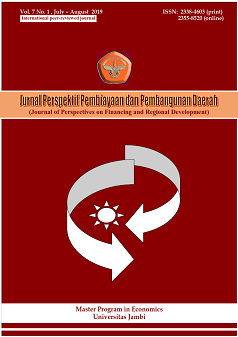Effect of capital inflows on financial development in Ghana
DOI:
https://doi.org/10.22437/ppd.v7i1.6611Abstract
The study examines the effect of capital inflows on financial development in Ghana. The study employs the Johansen and Juselius multivariate cointegration approach in analysing the interactions between the variables using annual data spanning 1970 to 2014. The results show foreign direct investment (FDI), external debt, and remittance inflows have significant negative impact on financial development in the long run. Furthermore, there was significant negative relationships between external debt, remittance inflows, and financial development in the short run. However, the relationship between FDI and financial development in the short run was not significant. The study was only limited to Ghana. However, the study will help countries particularly developing countries in analysing inflows of capital and their effect on the development of financial sector for policy purposes. Furthermore, this study provides avenues for policy makers to properly formulate policies containing capital inflows for effective financial sector development. Also, the study will help policy makers in terms of how issues of capital flight must be addressed and how to take pragmatic steps to channel remittances inflows to productive sectors of the economy.
Downloads
Downloads
Published
Versions
- 2019-08-31 (1)
- 2019-08-31 (1)

















